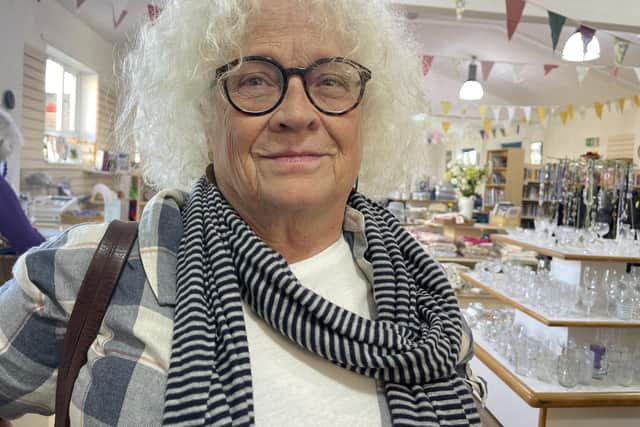How cost of living crisis and eco-conscience is driving more people to charity shops and preloved fashion
“We’re getting busier and busier,” she says of The Spring Community Shop and Cafe. “We’re rushed off our feet.”
The Spring is a not-for-profit social enterprise which has been run in the parish of Sandal Magna since 1997.
Advertisement
Hide AdAdvertisement
Hide AdThe shop offers second hand goods and clothing and the cafe prides itself on affordable, home-cooked meals, using ingredients from local suppliers.


“We are very much part of the church outreach and meeting the needs of the community,” says Anne, one of 80 volunteers at the site, which has become a community hub for people in Wakefield.
"You can buy a bargain, often people donate brand new wear, and you can even get something delicious and home-made to eat.
“People can come in on their own and there’s always someone to sit with. Two widowers who didn’t know each other sat next together in the cafe and are now best friends and come in together.
Advertisement
Hide AdAdvertisement
Hide Ad“We’ll start to see how the rising cost of living impacts us but we expect more people will need affordable clothes and a warm place to come for a home-cooked meal.”
Back in July, the i newspaper reported how an increasing number of consumers were turning to charity shops to buy their clothes in the cost of living crisis.
But that’s not the only factor behind rising demand, as Robin Osterley, chief executive of the Charity Retail Association (CRA) explains.
“Charity shops are central to their local communities and they’re often one of the first places people turn to when money is tight, so it’s not surprising that footfall has increased as people look to get the best value for their money.
Advertisement
Hide AdAdvertisement
Hide Ad"We’re also seeing a trend in people being more conscious in their shopping habits and choosing to shop sustainably, which has also contributed to the rise in people choosing charity shops.”
Just ten minutes away from The Spring, Wakefield Hospice has recently opened the Hidden Gems dress agency where people can buy and sell designer clothes, giving new life to preloved items.
Speaking as it launched in July, retail operations manager Matt Berry said: “Our aim is to provide a shop which features a range of high quality clothes and accessories such as those items purchased for special occasions but never worn again, designer goods looking for a new home plus a selection of new items such as ladies accessories and giftware.”
The combination of people both looking to save money in the cost of living crisis and working to address the impact of climate change by shopping more sustainably has meant preloved fashion has become more desirable – and that doesn’t just mean charity shop clothing.
Advertisement
Hide AdAdvertisement
Hide AdSmall businesses focusing on clothes alterations are also reporting a rise in demand. The owner of Alison’s Alterations in Wakefield Bus Station says the shop is busier than ever, whilst Cleckheaton-based designer Jordan Wake says she has started to do more alteration work.
The bespoke dressmaker has noticed a rise in such requests, claiming people still wanting to look “glam” but are now much more cost and eco-conscious.
“More people are getting alterations rather than a whole new gown with the rising cost of living,” she says.
“Sometimes it’s a size change, other times people want to reuse something like a prom or wedding dress for a night out.”
Advertisement
Hide AdAdvertisement
Hide AdFive thrifty sisters, for example, turned to 30-year-old Jordan to swap their clothes, having their dresses altered to one another’s sizes.
Jordan, of Wake Bespoke, says the siblings would normally spend well over £1,000 on a new dress each from her but now spend just over £100 to cover the cost of alterations.
“The sisters always love each other’s dresses so they have done it a few times, where they swap dresses and get them taken up or in. It’s great to see my original designs styled in so many ways and it means they can make the most out of lots of new outfits."
As people make more conscious choices to shop preloved rather than buying new, the Charity Shop Gift Card initiative was launched earlier this year, with the CRA as a partner.
Advertisement
Hide AdAdvertisement
Hide AdThe card can be used in a network of different charity shops around the country, including nearly 50 in Yorkshire.
Councils and other support agencies can also purchase the charity cards as part of their welfare assistance offering, to help financially vulnerable individuals and families.
The idea is that in using the card and purchasing from charity shops, people are helping to protect the environment by keeping useable clothing and other wares out of landfill, whilst also supporting a range of charities.
It comes at a time when charities themselves are also concerned about the cost of living crisis and the price of energy bills.
Advertisement
Hide AdAdvertisement
Hide AdThe CRA has written to the Government to raise the importance of making sure charity retailers are part of the conversation about support packages.
"They’re a lifeline to many people when times are hard,” Robin says, “not just as a source of affordable clothing and goods, but as warm, sociable spaces that are easily accessible and recognisable on local high streets.
“Charity shops also play a vital part in raising funds for the causes their charities support, which could be impacted if they have to face difficult decisions this winter.”